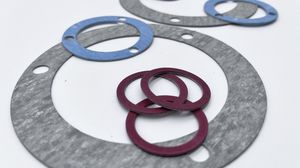
O-ring seal 0110100013flatcircularround
Add to favorites
Compare this product
Characteristics
- Type
- O-ring, flat
- Configuration
- circular, round, X-ring
- Material
- NBR, EPDM, silicone, FKM
- Application
- bar
- Other characteristics
- double-acting
- Diameter
Min.: 0.74 mm
(0.029 in)Max.: 658.88 mm
(25.94 in)
Description
When a part of an O-ring comes out of its groove and gets lodged in the gap between the two sealing elements, it is referred to as extrusion. This phenomenon compromises the seal and leads to rapid deterioration of the O-ring.
In combination with an O-ring or an X-ring, Back-up rings are used to overcome the problem of extrusion under high pressure. The back-up ring is placed on the opposite side of the pressure applied to the seal. In cases where pressure is applied from both sides of the seal (double-acting), two back-up rings are placed on either side. This is a simple, fast, and effective solution to implement.
Benefits and applications
Extended lifespan of the O-ring
Cost-effective solution with low sealing costs
• Possibility to widen machining tolerance of grooves
Resistance to pressures higher than that of the O-ring alone (recommended from 50 bar for any system)
Back-up rings are used in systems with severe pressures or high risks of extrusion. Most often, they are associated with O-rings.
5 profiles of back-up rings
Back-up ring T1: Spiral
Back-up ring T2: ST8C (flat) with a 30° cut
Back-up ring T3: ST8 (flat)
Back-up ring T4: ST9C (concave) with a 30° cut
Back-up ring T5: ST9 (concave)
Manufacturing process
Typically, elastomeric Back-up rings are obtained through moulding. However, upon request and for shorter lead times, Techné also offers machined parts. Plastic Back-up rings are obtained through machining.
Catalogs
No catalogs are available for this product.
See all of TECHNE‘s catalogs*Prices are pre-tax. They exclude delivery charges and customs duties and do not include additional charges for installation or activation options. Prices are indicative only and may vary by country, with changes to the cost of raw materials and exchange rates.






